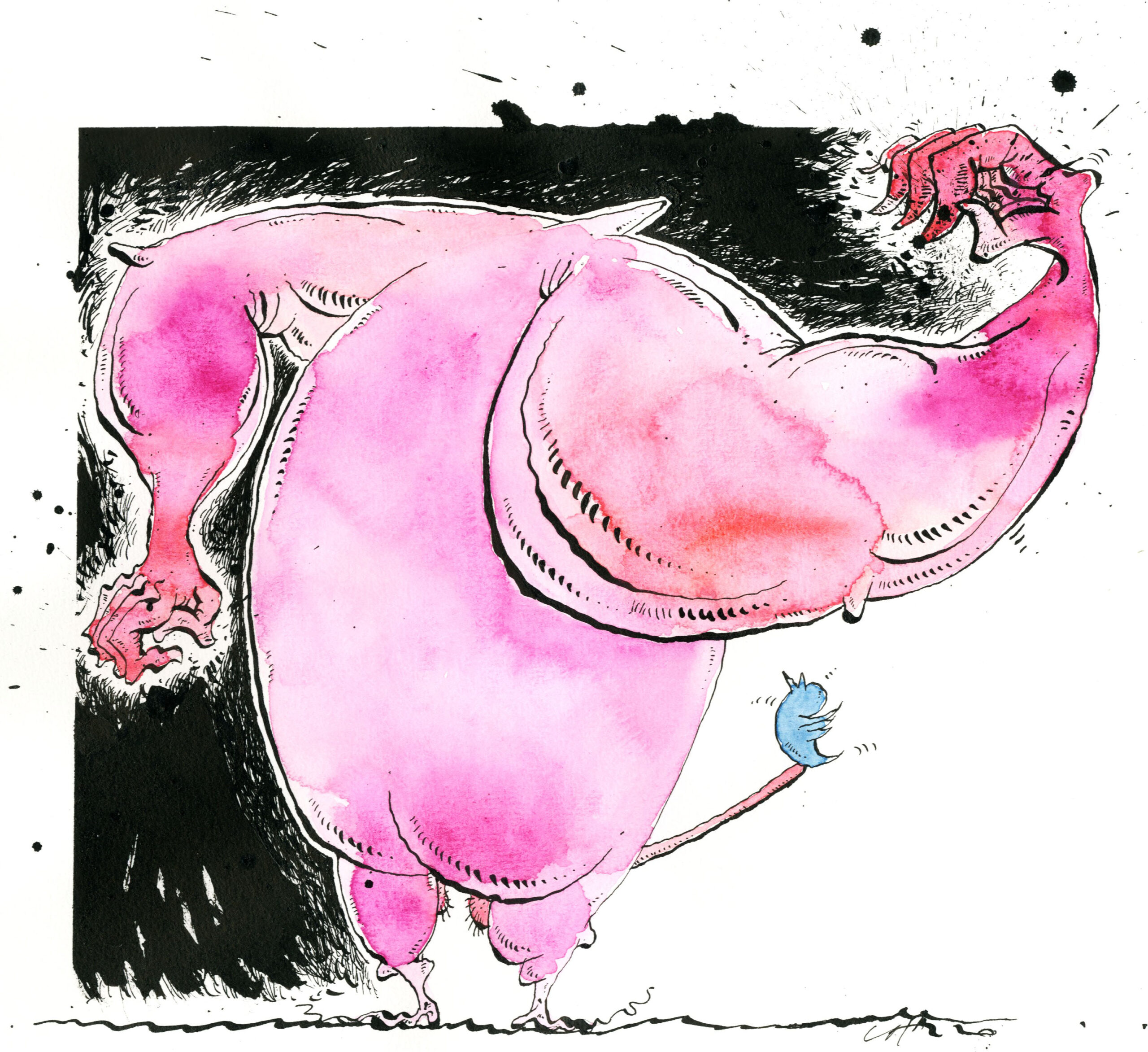- Gesellschaft, Medien
The Discourse of Masculinity Online
The banal evil of Tate, Peterson and Co. and what to do about them
Social networks like YouTube, Instagram, and TikTok are well known for their huge content output – and some of it is deeply misogynistic! This article analyses the most prominent anti-feminist actors and the effects they have on men.
I was one of the lucky ones when I discovered my first online men’s mental health forum four years ago: Movember, a women-friendly men’s mental health movement that has been going strong since 2003. They raise awareness about struggles surrounding substance abuse, war veteran issues, single dad issues, victims of domestic abuse and learning how to deal with emotions without resorting to anger and frustration, which are considered “typically masculine”.
I say I was one of the lucky ones because I did not end up hating women. When I took the time to do some research on social media about men’s mental health movements, I expected to find more initiatives like Movember. Movements in which women are incorporated positively as opposed to being the source of men’s problems. Instead, places like YouTube and TikTok seem to be platforms for middle-aged guys to get angry with women. For example, one guy spoke about how his wife left him and how she is the reason that he has nothing left.1 Another guy described how he feels disposable and how he has no success dating women.2 Or – and this is most commonly the case amongst young men – guys in their late teens to late 20s would upload videos in which they complain about how women have it easier than men, mainly because they allegedly have all the power in dating and relationships.3
The common denominator between these men and their feelings of disappointment and resentment towards women is anti-feminism. All of them seem to believe that feminism is at the root of their suffering; an ideology that fuels women’s minds with stories of female liberation, suffrage, and the fight for equal rights and equal access to professional opportunities.
How feminism became the root of chauvinist hatred
The idea that feminism “ruined” women for men is not only absolute nonsense but also deeply misogynistic. However, one could argue that women simply don’t need men the way they used to; over the past decades, women have gained more and more rights and became socially and financially independent. This is an idea that some men don’t like or indeed feel threatened by.

As a result, they turn to men who promise to restore their masculinity. Men like Andrew Tate, a British-American multi-millionaire entrepreneur and viral online sensation, who is currently under investigation for human trafficking4 and suspected of running a pyramid scheme5 and of sexual abuse6. Tate’s lifestyle of expensive cars, mansions, and multiple girlfriends is inspiring to a surprising number of young men. With his narrative of self-optimised and dominant manhood, Tate has been making big waves, particularly on TikTok, where millions of young men – even boys as young as 12 years old – are watching his misogynistic content.
In some of his videos, Tate explains (trigger warning!) how women must be choked and thrown onto the bed or slapped in the face if they say “no” to having sex. He describes women as male property and admits to dating 18-year-olds to “make an imprint” on them. But while all those statements might look like obvious breaches of human rights to some of us, millions of young men preach Tate’s ideas like he is the messiah of modern masculinity. Why? Because Tate proposes a strong, straightforward, hyper-masculine image of manhood and seems to offer a solution to the suffering of the modern man.
Before you become obsessed with being a good man to yourself, to other men, and women – ask yourself how you can be a decent person first.
Another one of these figures is the clinical psychologist Dr. Jordan B. Peterson. The Canadian takes on the role of a wise father figure for young men. He is well-known for his bestselling books 12 Rules For Life and Beyond Order, which contain typical self-help content. Above all, Peterson is a skilled rhetorician: one of his strengths is using pseudo-intellectualism to convince young men that women want to submit to them. They just have to make women realise this and see past their feminist ideology. This narrative can be especially dangerous for women when Peterson’s conservative rhetoric blends with Tate’s blatant misogyny.
The misogyny of Peterson, Tate and their respective followers is particularly evident in the way they speak. For example, they only refer to women as “females”. Not only does this reduce women to their biological predisposition to carry children, but it also excludes all transgender, intersex, and non-binary people who don’t see themselves as either women or men. If someone doesn’t fit these men’s world order, they simply do not exist.
Why Peterson’s intellect gives him the upper hand
Just like Andrew Tate, Jordan Peterson spends a lot of his time discussing allegedly submissive female energy and the supposedly dominant male energy. In his narrative, men represent “order” while women represent “chaos”. This is underlined in his interview with the feminist professor Camille Paglia in 20177: About 30 minutes into the conversation, Peterson argues that an “underlying threat of physicality” in conversations between men “keeps the things civilised to some degree”. Consequently, a man who doesn’t engage in a fight becomes a man who doesn’t deserve respect in Peterson’s eyes.
While this strengthens the sexist notion that masculinity is inextricably linked with displays of violence, Peterson also uses the argument to emphasise his misogyny. As he continues talking about the allegedly civilising effects of violence, he adds: “That’s forbidden in discourse with women and so I don’t think that men can control crazy women.” He also refers to the feminist movement as one “kind of female insanity”. This is problematic in two ways; the idea that feminism makes women “insane” and the notion that “crazy women” can be controlled through violence.
While Tate’s misogyny is in-your-face, Peterson takes a more subtle and pseudo-intellectual approach. This makes him more dangerous, as it’s difficult to figure out his agenda. Peterson was the subject of controversy and received huge backlash online and in real life for his takes on gender roles and his remarks about trans people and gender pronouns8. As a result, he resigned from his position as professor at the University of Toronto in the autumn of 2021.9
Not just a matter of Lost Boys
While these narratives may seem like a niche online phenomenon, it would be too easy to dismiss this movement as a group of young men who haven’t found their way in the world. People like Peterson and Tate and their hate speech have real-world consequences. In addition, the online discourse about hyper-masculinity, gender-based violence and female submission is often linked with the rise of alt-right politics, neo-fascism, and neo-Nazi ideology.10 This is a political threat that needs to be taken seriously.
Luckily, alongside countless women, several men are also committed to fighting this development: Hasan Piker, Noah Samsen and most notably F.D Signifier. The latter has an extensive three-part series on the serious and politically urgent aspects of these movements11. Signifier offers a critical perspective on social media and entertainment which encourages young men to cultivate a strong, politically aware stance. Hasan Piker goes about it differently: in his daily eight-hour streaming show on Twitch, he engages directly with alt-right people. Noah Samsen, on the other hand, takes a different approach: he posts shorter videos on YouTube and TikTok in which he debunks false information.
One question remains, though: what is the right way to be the “good” kind of man? Clearly, these three men exude traditional masculine values in their videos and this narrative can be attractive to younger men for reasons similar to why Peterson and Tate are attractive – their target audience appreciates displays of intellectualism and physical strength. However, there are larger issues at play here. How can I be a good man if I don’t even know how to be a decent person? Left-wing content creator Big Joel discusses this on YouTube12 and urges everyone, regardless of their background, to look inward and think about their values and how they affect other people. Alice Cappelle takes a similar approach on her YouTube channel. Both ask: do I, as a person and regardless of my sex and gender, have a positive or negative effect on the people around me? To Big Joel and Cappelle, the question of being a good person is more relevant than thinking about one’s role in the world solely in terms of one’s biological sex and social gender.
Their message urges young men to ask self-reflective questions and take local action by meeting different people. To the men reading this article: before you become obsessed with being a good man to yourself, to other men, and women – ask yourself how you can be a decent person first. To the non-men reading this: talk to the men in your life about these ideas. You are more than just your biological sex and your social gender, and your impact on the world is not only determined by your idea of masculinity. Work with women, not against them.
Pierre Balthasar is a 27-year-old Ph. D. candidate at the University of Luxembourg in Luxembourgish Studies for Philosophy and Literature, a men’s mental health advocate through Movember since 2019 and a member of the Young Left (Jonk Lénk).
1 https://www.youtube.com/watch?v=P0dwWLY3SyY (every online reference in this article has last been visited on the 15th of June).
2 https://www.youtube.com/watch?v=xDI4F7eWu7k
3 https://www.youtube.com/watch?v=XvzPDAdWODA
4 https://nypost.com/2023/04/10/andrew-tates-devices-searched-as-human-trafficking-probe-continues/
5 https://tinyurl.com/the-guardian-tate
6 https://tinyurl.com/sky-news-tate
7 https://youtu.be/v-hIVnmUdXM
8 https://www.bbc.com/news/world-us-canada-37875695
9 https://www.insidehighered.com/news/2022/01/21/jordan-peterson-retires-u-toronto
10 https://www.youtube.com/watch?v=dr0DhS8GNlo
11 https://www.youtube.com/watch?v=s1FkO7Tr70A
12 https://www.youtube.com/watch?v=uQqJqovXeDg
Als partizipative Debattenzeitschrift und Diskussionsplattform, treten wir für den freien Zugang zu unseren Veröffentlichungen ein, sind jedoch als Verein ohne Gewinnzweck (ASBL) auf Unterstützung angewiesen.
Sie können uns auf direktem Wege eine kleine Spende über folgenden Code zukommen lassen, für größere Unterstützung, schauen Sie doch gerne in der passenden Rubrik vorbei. Wir freuen uns über Ihre Spende!
